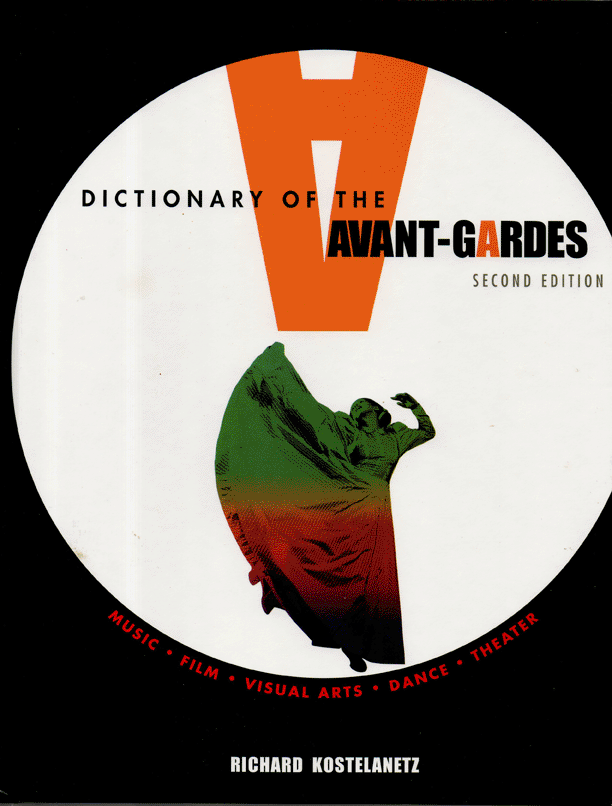
2000. A Dictionary of the Avant-Gardes (Second Edition)

I have mixed feelings about my inclusion in this book. For one thing, I'm so marginalized in it that it would be ridiculous to even bother to mention it if I weren't trying to be thorough here. For another, that very marginalization is indicative of what the 'Avant-Garde' has become. I'll explain what I mean by that eventually.
Don't misunderstand, I have Geof Huth to thank for my inclusion here & I'm grateful to him for that. However, as you can see from the scanned "Monty Cantsin" entry below, I barely make it in. See the detail that follows the large scan below.
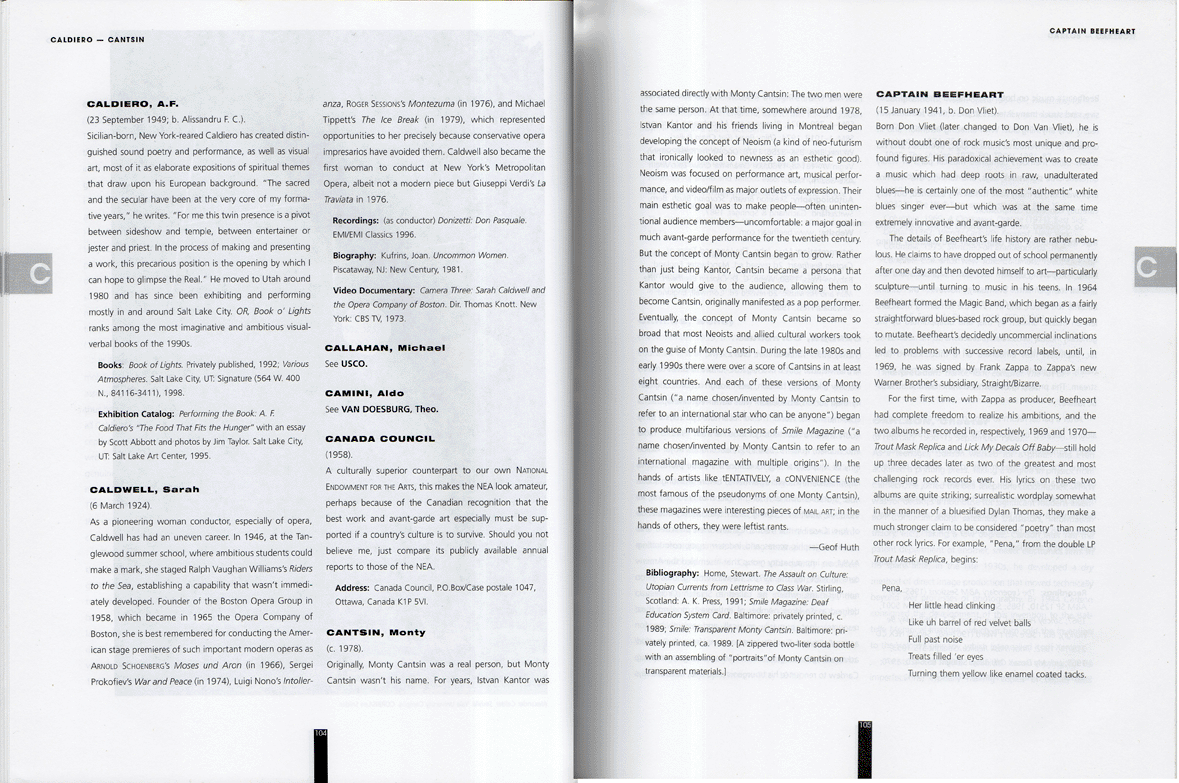
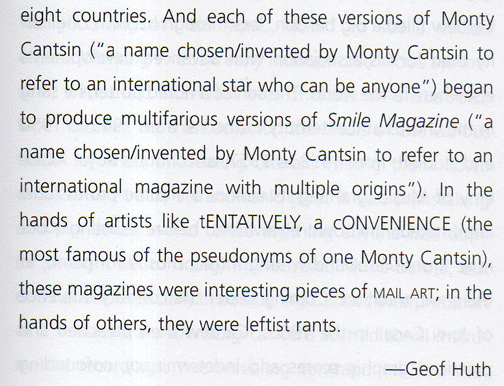
As someone born in 1953, I came along decades after the idea of the "Avant-Garde" was established. As a young man, I found the activities of the avant-garde very stimulating. In fact, I still do. HOWEVER, as I understood the avant-garde it was meant to refer to the cutting edge of innovative cultural production & it's long since seemed to me that CONTEXT is extremely important for that. As such, I think that the CONTEXT of the "Avant-Garde" has outlived its own usefullness. In other words, once a context has been established, it's no longer cutting edge.
Hence when I was in conversation with people in, say, no later than 1981 & they automatically assumed that my work was 'avant-garde' I'd explain that I preferred a different context, a fresher context, a more cutting edge context, a context I created myself. Since the mid 1970s I've been explaining to people that I'm a Mad Scientist / d composer / Sound Thinker / Thought Collector / As Been - a self-description I've long since expanded upon greatly - & NOT an "artist". I was trying to get people to understand that I think "art" is an outmoded context.
Such innovativeness on my part is a double-edged sword. On the one hand I think it establishes me as thinking of the bigger picture, on the other hand it immediately alienates me from the people who're dependent on pre-fabricated contexts - which, as I've discovered, is almost everyone.
SO, if I say I'm not a poet because I think the notion of 'poetry' is an uncreative context then I immediately get rejected from most poetry contexts which might be the most open-minded places for appreciating writing of mine that doesn't fit into any other pre-fab context easily either.
Take, eg, the following example of my Number Writing made no later than 1978:
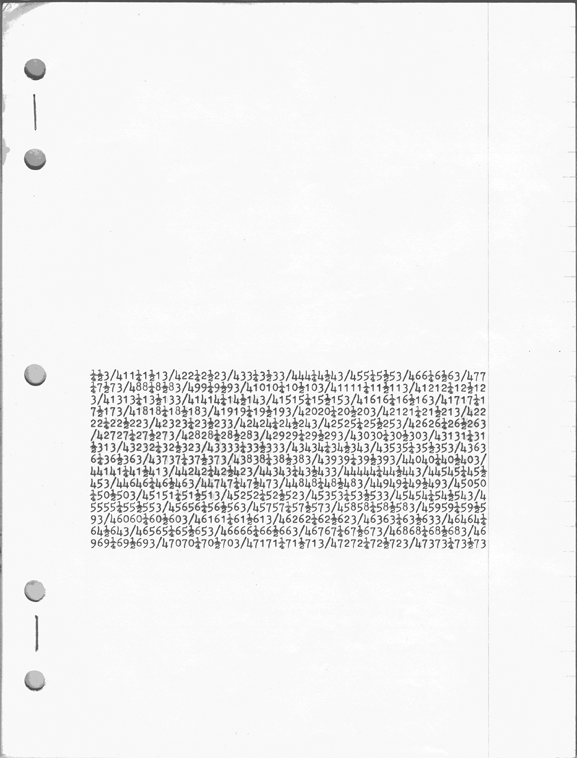
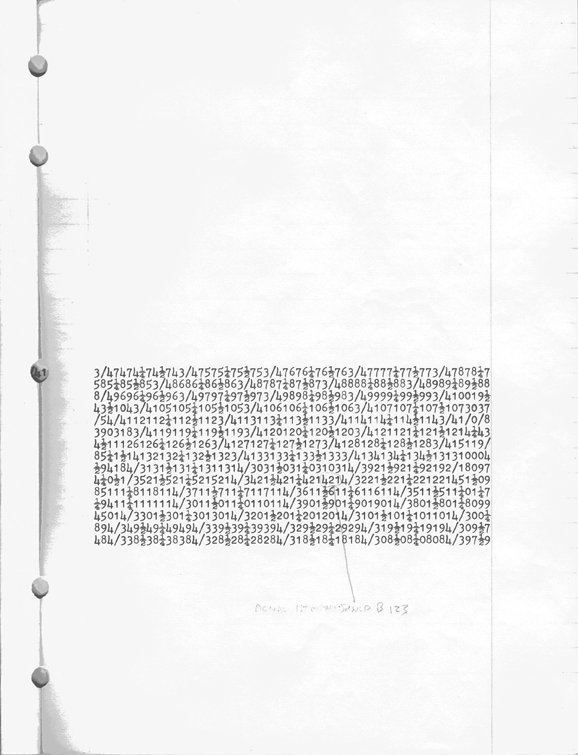
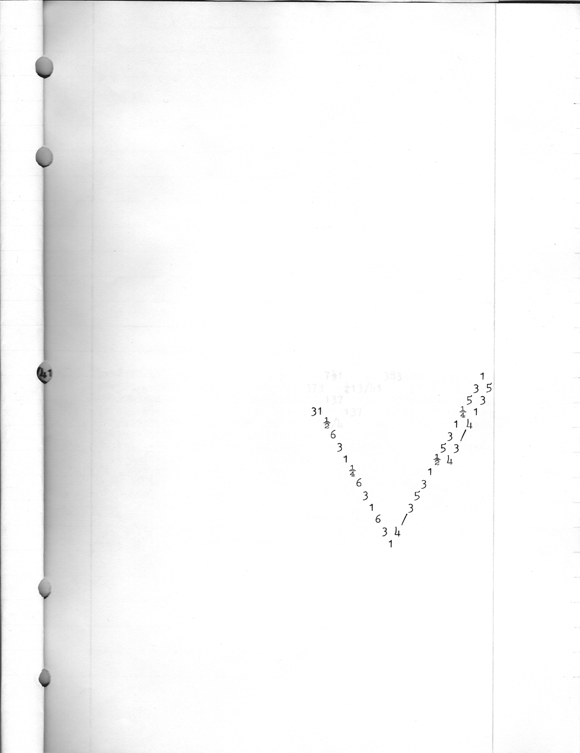
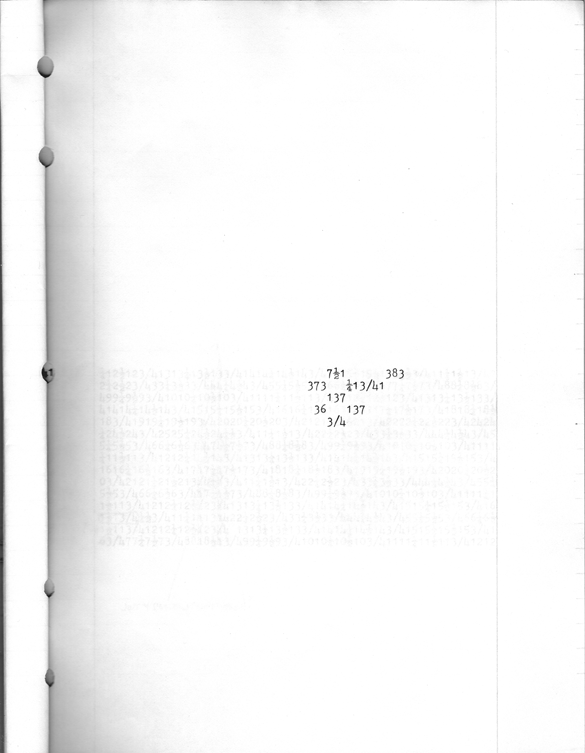
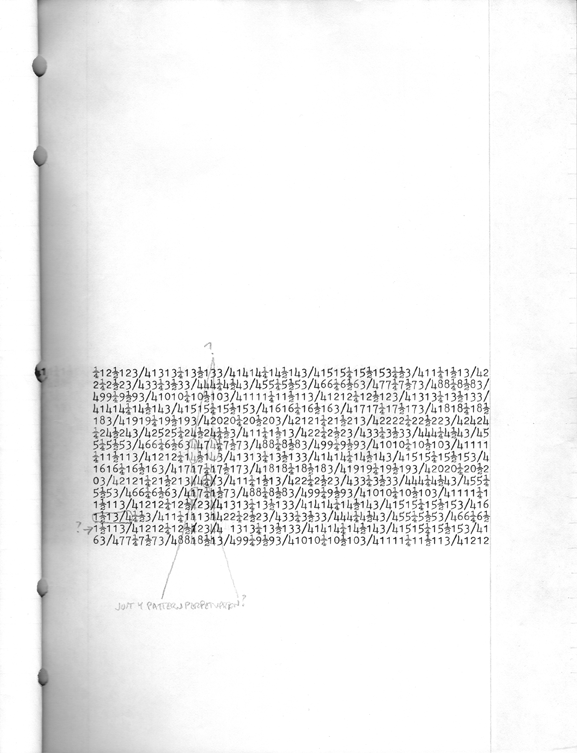
Who is going to read something like this?! If I call it "Avant-Garde Poetry" then it immediately has a context in which it might be appreciated - but what if I simply prefer calling it, as I do, "Number Writing" instead - denying it as either "Avant-Garde" or "Poetry"? I'm effectively eliminating almost all of its potential readership.
When I 1st met Jackson Mac Low in 1977 ot 1978 I probably gave him a copy of my 1st book & I definitely showed him the above number writing. He asked me to explain it & I did & he told me that "It's better than what Richard Kostelanetz is doing with numbers." That meant a lot to me - not only was Jackson not in the least concerned with whether it was 'poetry' he was also still able to place it in comparison to other work he was familiar with. Jackson was one of those very rare people who supported my writing at the time. Kirby Malone was another.
Hence, it's no suprise that in Jackson's entry in "A Dictionary of the Avant-Gardes" below he brings up issues of the context of "Avant-Garde" that have also concerned me.
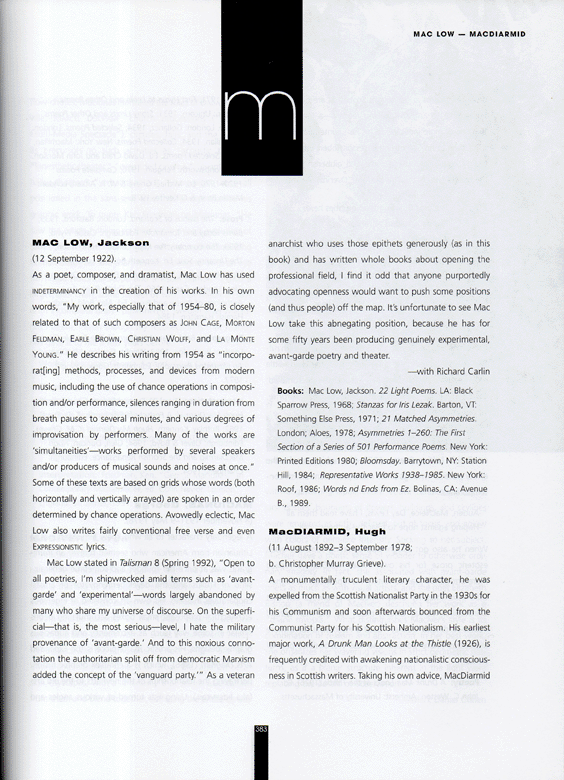
You'll note that Mac Low's credited with saying: "On the superficial--that is, the most serious--level, I hate the military provenance of 'avant-garde.' Add to this noxious connotation the authoritarian split off from democratic Marxism added the concept of the 'vanguard party.'" As an anti-war anarchist, I agree with Mac Low's concern about militaristic & authoritarian associations.
Alas, rather than understanding Mac Low's point, the entry for him here concludes with "I find it odd that anyone purportedly advocating openness would want to push some positions (and thus people) off the map. It's unfortunate to see Mac Low take this abnegating position". Is that what Mac Low is doing?! I think not! I think he's simply trying to call attention to important etymological issues. Kostelanetz, on the other hand, seems to just be knee-jerk defending the language he's been using for many decades. Is THAT Avant-Garde?!
What the above exemplifies for me is that it's possible for the "Avant-Garde" to turn into a conservative context with proponents concerned with protecting its reputation against people who're criticizing it NOT because we're against it but because we take it more seriously than most. But let's get back to math:
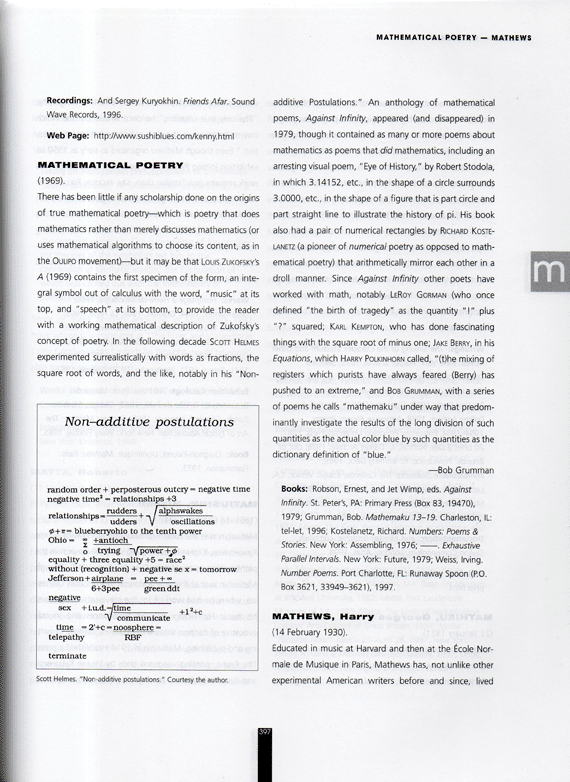
Bob Grumman created the above "Mathematical Poetry" entry. He also wrote a series of articles for Scientific American about Mathematical Poetry or Mathematical Visual Poetry or some such. When I learned about this & learned that he was looking for work that might fit his interests I was excited & wanted to share something with him.
Not only had I created the number writing from the mid-1970s shown above but I'd also written a math book in the beginning of 2008 called "Paradigm Shift Knuckle Sandwich & other examples of P.N.T. (Perverse Number Theory)" (finally published 9 years later & available through Amazon & elsewhere) & made other math-related work including a movie called "Haircut Paradox" (on my onesownthoughts YouTube channel here: http://youtu.be/pXMl1ZbMm9I ). NONE of this work fits easily into any pre-fab context. As such, the thought of it being referenced in Scientific American excited me because I thought there might be a remote chance that someone in that readership might appreciate it.
I was in the process of uploading "Haircut Paradox" to YouTube & having technical troubles because of the 'ancientness' of my computer set-up & internet access when I contacted Grumman. I'm sure that I wrote him entirely too many times about the impending upload & that he was annoyed. At any rate, as far as I know he never referenced the work.
Now, "Haircut Paradox" is NOT Visual Poetry. Even though I like Visual Poetry I find that, too, to be a not very interesting context that usually produces work that's basically Art with Language in it with a concern for aesthetics rather than lingual content. As such, the Scott Helmes example shown above is visually interesting but the math notation in it is somewhat semantically irrelevant. Even though I like the piece, I would like it more if I thought Helmes were actually putting forth a serious notion of "pee + = divided by green ddt" which I think is fanciful rather than mathematical.
My own math work actually has something to do with math - even though it's so heretical (& sloppy) that no mathematician is likely to find it anything other than ridiculous.
The conclusion?: I'm sorry that I don't have a serious entry in this Dictionary. I like most of the work by most of the people in it & would feel that I was in good company if I were included. At the same time, I AM in a new generation that's left these particular avant-gardes behind. Incredibly enough, at age 62, my work still seems to defy categorization - which is exactly as it should be - even if it DOES frustrate me to experience so little acceptance or interest. - March 28, 2016E.V. notes from tENTATIVELY, a cONVENIENCE
idioideo at verizon dot net
to the tENTATIVELY, a cONVENIENCE Anti-Neoism page
to the tENTATIVELY, a cONVENIENCE Audiography page
to the tENTATIVELY, a cONVENIENCE Bibliography page
to my "Blaster" Al Ackerman index
to the site that lists the Books that tENTATIVELY, a cONVENIENCE has something in or is mentioned in
to the tENTATIVELY, a cONVENIENCE BYOC page
to the tENTATIVELY, a cONVENIENCE Censored or Rejected page
to tENTATIVELY, a cONVENIENCE's Collaborations website
to the tENTATIVELY, a cONVENIENCE (d) compositions page
to Amir-ul Kafirs' Facebook page
to the "FLICKER" home-page for the alternative cinematic experience
to Gifs made by Ryan Broughman
to tENTATIVELY, a cONVENIENCE's GoodReads profile
to Graffiti index
to the tENTATIVELY, a cONVENIENCE Home Tapers
to the tENTATIVELY, a cONVENIENCE index page
to tENTATIVELY, a cONVENIENCE'S minimal International Union of Mail Artists page
to a listing of tENTATIVELY, a cONVENIENCE's manifestations on the Internet Archive
to the tENTATIVELY, a cONVENIENCE as Interviewee index
to the tENTATIVELY, a cONVENIENCE as Interviewer index
to tENTATIVELY, a cONVENIENCE'S Linked-In profile
to the mm index
to see an underdeveloped site re the N.A.A.M.C.P. (National Association for the Advancement of Multi-Colored Peoples)
to tENTATIVELY, a cONVENIENCE's Neoism page
to the DEFINITIVE Neoism/Anti-Neoism website
to the Philosopher's Union website
to the tENTATIVELY, a cONVENIENCE movie-making "Press: Criticism, Interviews, Reviews" home-page
to tENTATIVELY, a cONVENIENCE's Score Movies
to SMILE
to find out more about why the S.P.C.S.M.E.F. (Society for the Prevention of Cruelty to Sea Monkeys by Experimental Filmmakers) is so important
to the "tENTATIVELY, a cONVENIENCE - Sprocket Scientist" home-page
to the Tattoos index
to Psychic Weed's Twitter page
to tENTATIVELY, a cONVENIENCE's Vimeo index
to Vine movies relevant to tENTATIVELY, a cONVENIENCE made by Ryan Broughman
to tENTATIVELY, a cONVENIENCE's presence in the Visual Music Village
for info on tENTATIVELY, a cONVENIENCE's tape/CD publishing label: WIdémoUTH
to a very small selection of tENTATIVELY, a cONVENIENCE's Writing